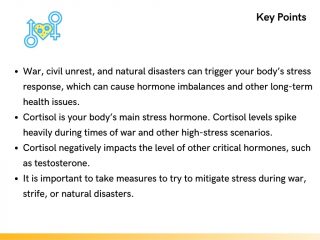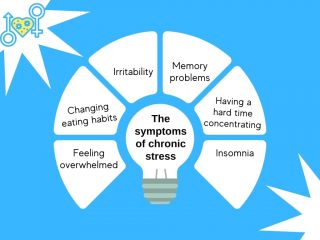
Every year, millions of people worldwide face war, civil unrest, and other natural disasters. Whether it is a battle-driven conflict, or hurricane, flood, or tornado, these worst-case scenarios bring with them physical dangers as well as mental strife, which can negatively impact your hormone levels for both the short and long term.
Is There a Link Between War and Hormonal Changes?
War… it is a horrible situation that takes its toll on lives lost and property damaged. But beyond that, for those living in or near a war zone, or people who are survivors of war, or concerned about loved ones fighting in or living near a war, there is another toll. The one that war and similar situations of strife, such as civil unrest and natural disasters, take on our health due to the way stress wreaks havoc on our hormones.
A study entitled “Psychological condition hormone levels in war trauma” concluded that the rise and fall in hormonal levels resulting from stress and psychological disorders experienced by those in a war zone related to “stress-induced psychological/hormonal responses, and not to the trauma per se.”
The Psychological Toll of War
The psychological toll of war affects soldiers and non-combatants alike and can be both immediate and long-term. Initial mental impacts of war are feelings of shock, fear, and grief, but as victims suffer the loss of homes, work, and loved ones, they often face longer-term problems such as post-traumatic stress disorder (PTSD), depression, and anxiety. Even long after the fighting has ended or the disaster has passed, wars, civil unrest, and natural disasters also often drive an increase in alcohol and drug abuse and suicide.
Cortisol Levels During War
The negative emotional and psychological scars caused by war are all about stress and cortisol levels. Cortisol is the hormone most closely related to stress and your “fight or flight” reaction. Many mistakenly believe that testosterone is the hormone that drives your body’s reaction to a stressful situation. However, it is cortisol that is released into your blood that causes the release of adrenaline and the subsequent higher heart rate that gives us the physical boost you need to escape or handle danger.
However, there is a critical relationship between cortisol and testosterone. Cortisol and testosterone are antagonists. High levels of cortisol in your blood actually lower your testosterone level. Therefore, men who are often under chronic stress, as they would be during a time of war or other crisis, are likely to experience stress-related low testosterone. This is just one of the many ways that the stress-induced cortisol release during a time of war can impact your other hormones and your overall health.
A 2018 study published in the journal Military Medicine that set out to specifically look at the impact of war, stress, and cortisol levels concluded that “elevated cortisol increases vulnerability for stress-evoked depression in the war zone.”
Stress and Hormonal Health
Stress is defined as a feeling of emotional or physical tension. It can come from any event or thought that makes you feel frustrated, angry, or nervous.
Stress is part of your body’s natural defenses linked to your “fight or flight” response. Stress is your body’s reaction to a challenge or demand. In short bursts, stress can be positive, such as when it helps you avoid danger or meet a work deadline. But when stress lasts for a long time, it may harm your mental, physical, and emotional health.
The symptoms of chronic stress include:

Long-term or chronic stress has a number of detrimental health impacts, not the least of which is that stress can lower your testosterone levels. Low testosterone can lead to many short and long-term problems, such as insomnia, anemia, and erectile dysfunction. You can find a complete list of conditions and diseases that could be caused by low testosterone by clicking on the preceding link.
Understanding Stress Hormones
Your body reacts to stress by releasing hormones. These hormones make your brain more alert, cause your muscles to tense, and increase your pulse. In the short term, these reactions are good because they can help you handle the situation causing stress. This is your body’s way of protecting itself.
Stress hormones or “counter-regulatory hormones” are hormones released during stressful situations, such as danger, illness, or infection. These hormones include glucagon, epinephrine (adrenaline), norepinephrine, cortisol, and growth hormone.
However, a buildup of too many stress hormones, particularly the stress hormone cortisol, can have damaging effects. This can happen when the stressful situation does not abate and goes on for a very long time, as it can during a time of war.
An excessive amount of cortisol in the bloodstream as a result of chronic stress or anxiety can have several health consequences, such as:
- Increased blood sugar
- Weight gain
- Lowered immune response
- Digestive issues
- Increased risk of heart disease
- Lowered testosterone levels
War’s Long-Term Effects on Health
The long-term mental impacts of war cannot be understated. According to the World Health Organization, “Among people who have experienced war or another conflict in the previous 10 years, one in five (22%) will have depression, anxiety, post-traumatic stress disorder, bipolar disorder or schizophrenia.”
These impacts and, particularly the ones that lead to cortisol-induced hormonal imbalance can last for decades after the war is over the natural disaster has passed. Research published in Proceedings of the National Academy of Sciences found that survivors of the devastating December 2004 tsunami that hit the coast of Indonesia, killing more than 230,000 people, experienced symptoms of PTSD and what they referred to as “hormonal burnout” almost 15 years later!
The authors of the study targeted a specific stress response hormonal system known as the hypothalamic-pituitary-adrenal (HPA) axis, which controls your level of cortisol, among other hormones. As mentioned earlier, it is part of your normal “fight of flight” reaction for cortisol to rise and then lower again when the stress has passed. But when faced with repeated high levels of stress, the HPA axis can experience “burnout,” which can lead to a “longer-term inability to mount the healthy response you want to react to your daily stressors,” the study concluded.
PTSD and Hormonal Imbalance

No matter, if it is an armed conflict or fire, flood, chemical spill, explosion, or any other man-made or natural disaster, being exposed to one means you will face the very real possibility of death or physical injury. You may also lose your home, possessions, or your way to make a living. Such stressors place you at risk for emotional and physical health problems.
The stress reactions after a disaster do not differ all that much from the way your body reacts to any stressful situation or trauma. The problem is because of the grand scale of the devastation that can occur during a war or disaster and the various distressing sights, sounds, and smells it can ingrain in your psyche something called “triggers.” And it is these triggers that cause what used to be called “combat fatigue,” but we now more accurately describe as PTSD – or Post Traumatic Stress Disorder.
Studies have found that people with PTSD have abnormal levels of stress hormones such as adrenaline and cortisol in their systems.
A person diagnosed with PTSD often experiences specific symptoms — such as recurrent dreams or flashbacks — following a traumatic event. PTSD can be quite severe, often interfering with your daily responsibilities. PTSD usually requires sessions with a mental health professional and the employment of specific therapeutic methods to work through your triggers and difficult emotions.
Chronic Health Conditions Post-War
The long-term health hazards caused by war, even after one ends, go well beyond PTSD and the war’s impact on cortisol-induced stress and hormone imbalances. In the aftermath of war, the area’s health infrastructure will be broken, making access to care a significant health problem. Disease and famine often strike an area in a war zone and persist long after the combat is over. These issues are exacerbated by a lack of clean water, sanitation, etc.
Disasters Beyond War: Hormonal Impact

While war may be the most physically and emotionally traumatic experience that anyone can ever go through, it is not the only horrifying scenario that can cause the kind of long-term stress and hormonal issues thus far discussed. As proven by the research on the tsunami victims mentioned above, a severe natural disaster can cause the same kinds of responses and similar “hormonal burnout” and PTSD.
Furthermore, you do not even have to have been actively involved in a disaster to feel the stress and negative hormonal impacts. Being exposed to constant bad news and ongoing images from wars and disasters, like the current situation in the Middle East and Ukraine and the recent uptick in wildfires, tornadoes, and other disasters, can have the same effect.
Mitigating Hormonal Effects of War and Disasters
Is there any way to mitigate these kinds of stress reactions to war and disasters? If you are actively involved in combat or living in a war zone, you can and should try to take measures to reduce your stress once you have secured your safety, of course.
If you are experiencing stress from seeing and hearing tooo much about such things, it’s ok to “tune out” and take a break from cable news and social media.
Strategies for Hormonal Balance
Here are some ways to manage stress and try to regulate a good hormonal balance. You do not have to be in a war zone or facing a disaster to benefit from these—for your mental and physical health, you should practice some stress-relief techniques every day.
- Eat a healthy diet.
- Get enough sleep.
- Exercise regularly.
- Reduce your consumption of alcohol and caffeinated drinks.
- Quit smoking
- Practice meditation, yoga, tai-chi, or other stress reduction techniques.
Mental Health Support and Hormonal Regulation
If you have been diagnosed with PTSD and or a hormone imbalance, no amount of stress reduction techniques is going to help. You need to seek professional help. If your stress is found to be caused by low testosterone or any other kind of hormone imbalance, your treatment may include hormone replacement therapy (HRT). Contact Us today if you would like to know more about stress, hormones, and the benefits of HRT.

